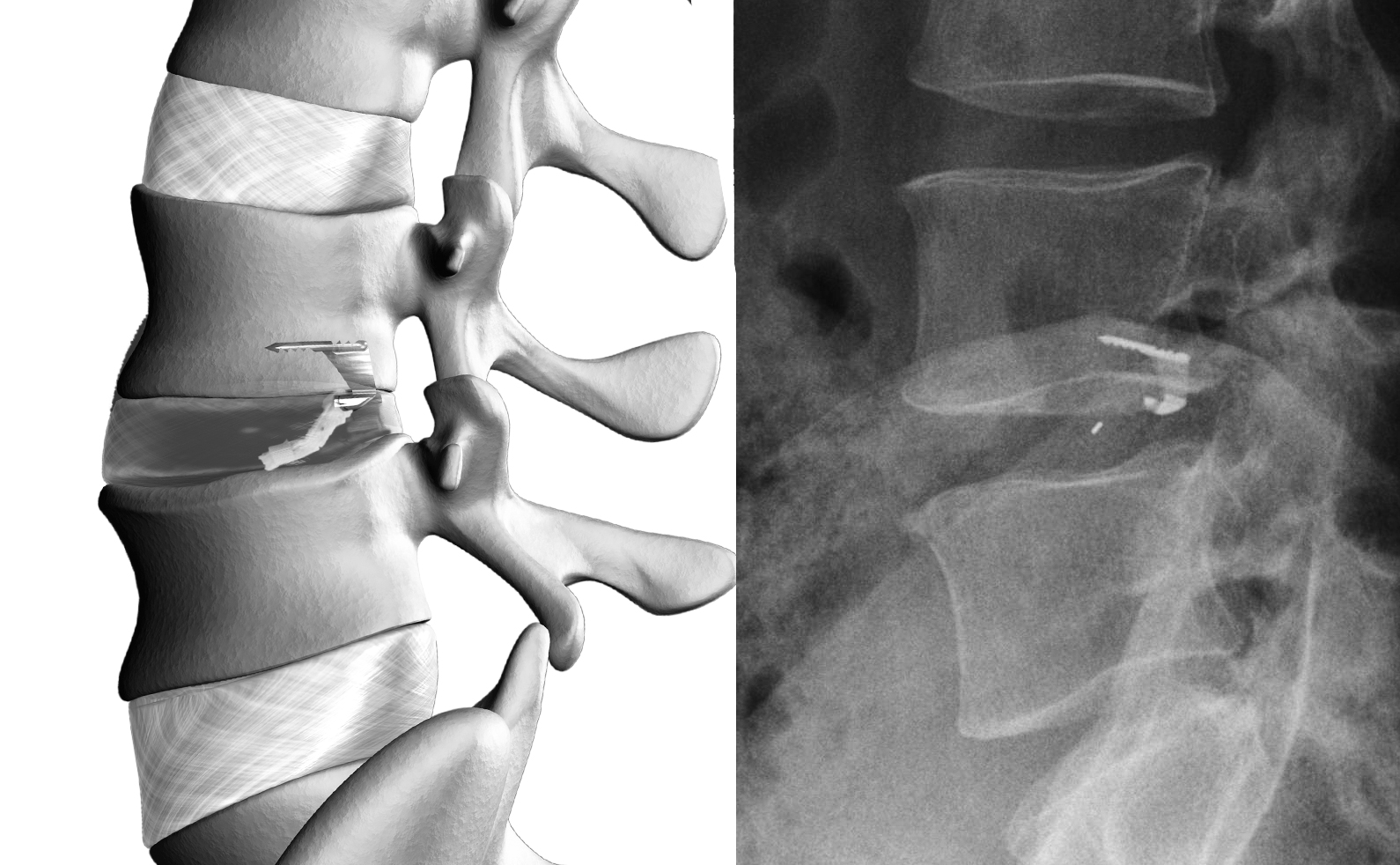STRENGE Spine Center Offers Barricaid Technology For Discectomy Patients

Discectomy surgery serves as a crucial intervention for herniated or bulging discs in the spine, aiming to alleviate nerve compression and associated symptoms. Following the procedure, however, the risk of reherniation remains a concern, prompting the need for innovative solutions. Barricaid, an implant designed to seal holes in the disc wall, emerges as a promising intervention to mitigate the risk of reherniation. STRENGE Spine Center is excited to offer this device for our discectomy patients.
What is a Discectomy?
A discectomy is a surgical procedure performed to treat herniated or bulging discs in the spine. During the discectomy, Dr. Strenge removes a portion of the intervertebral disc that is pressing on nearby nerves, causing pain, numbness, or weakness. This minimally invasive procedure is often done through a small incision, using specialized instruments to access the affected area. By relieving pressure on the nerves, a discectomy aims to alleviate symptoms and restore function to the affected area of the spine. It is commonly used to treat conditions such as herniated discs, sciatica, and spinal stenosis, helping patients regain mobility and quality of life.
What Do Surgeons Do With A Hole Left In The Discectomy?
The current standard practice in discectomy surgery is to leave the hole in the disc unrepaired. However, this approach poses a high risk of recurrent herniation and may necessitate further surgery if the hole exceeds the size of a pencil eraser. After the procedure, patients are advised to refrain from lifting or twisting to allow the hole to heal and scar over before resuming normal activities.
Why Is It Important To Close The Hole After A Discectomy?
When a disc herniates, it occurs due to the development of a hole or weakness in the disc wall, leading to the protrusion of disc material. During the discectomy procedure, the surgeon accesses the disc through this opening. Leaving a large hole open increases the risk of reherniation by over 27%, resulting in the recurrence of pain and symptoms. Barricaid is engineered to address this issue by creating a barrier that reduces the likelihood of reherniation.
Your Risk of Reherniation Lumbar discectomy, aimed at alleviating symptoms of herniated discs, typically boasts high success rates, with approximately 84% of patients experiencing positive outcomes. However, despite its efficacy, the possibility of disc reherniation and subsequent surgery remains. Reherniation, also known as recurrent disc herniation, is a common complication post-lumbar discectomy, affecting 7-18% of patients.
Certain lifestyle choices elevate the risk of recurrence: Sedentary Lifestyle: Prolonged inactivity can lead to muscle stiffness, exacerbating the chances of poor post-surgery outcomes.
High BMI: Morbidly obese patients face a significantly higher risk of reherniation, as demonstrated by studies.
Improper Lifting: Incorrect lifting techniques increase spinal disc pressure, predisposing individuals to reinjury.
Tobacco Use: Smokers have a 50% higher reherniation rate post-surgery compared to non-smokers.
Diabetes: Uncontrolled diabetes doubles the recurrence rate following discectomy surgery, according to research findings.
How Barricaid Can Help
Barricaid, slightly larger than a pencil eraser, functions as an implant designed to seal larger holes in the disc wall. Comprised of a titanium bone anchor and polymer plug, it reconstructs and repairs the disc wall by securing the plug within the disc space.
Using a specialized instrument, Barricaid's polymer plug is inserted into the disc hole, where internal pressure holds it against the disc wall, preventing further material escape. A titanium anchor is then hammered into the bone, firmly securing the polymer plug in place.
In clinical studies across seven different patient groups, Barricaid demonstrated an 81% reduction in reoperations for reherniations compared to those who underwent standard discectomy alone. This translates to 81% fewer Barricaid patients requiring a second operation due to recurrent symptoms. Second surgeries often result in disability, with 68% of patients unable to return to work and 88% relying on opioids for pain management.
Are You a Good Candidate for Barricaid?
Barricaid targets patients prone to discectomy failure who wish to avoid the potential risks and disability associated with a second surgery. Talk to your surgeon to discuss your risk of reherniation and if you are a good candidate for Barricaid.
Those who opt for Barricaid alongside their discectomy experience an 81% lower likelihood of requiring additional surgery compared to those undergoing discectomy alone. This enables patients to resume work and activities without constraints on their daily lives.
Dr. Strenge incorporates Barricaid into his discectomy surgeries for patients at risk of recurrent disc herniation. By utilizing this innovative implant, he aims to minimize the chances of reherniation and the need for subsequent surgeries. With Barricaid, patients have a higher likelihood of successful outcomes and can regain their mobility and quality of life more swiftly. If you're experiencing symptoms of a herniated disc or have concerns about the success of a previous discectomy, book an appointment with Dr. Strenge to explore your treatment options and determine if Barricaid is right for you.
Read more about Barricaid
MORE FROM STRENGE SPINE CENTER
RELATED ARTICLES
IDEAL Symposium in Dallas
On May 17-18, Dr. Strenge participated in the IDEAL Symposium in Dallas, TX. Dr. Strenge discussed the Barricaid procedure to prevent re-herniation and re-operation after a disc herniation procedure.
Posterior Cervical Fusion at Strenge Spine Center, Paducah, KY
Posterior cervical fusion is a surgical procedure performed by Dr. K. Brandon Strenge at Strenge Spine Center in Paducah, KY, to address various spinal health issues affecting the cervical (neck) region of the spine.
Scoliosis Symptoms & Treatments in Paducah, KY – Dr. Strenge
Scoliosis is an abnormal curvature of the spine that causes the spinal column to form an “S” shape or a “C” shape. While a small degree of scoliosis may not cause any issues, moderate and severe scoliosis can cause pain, difficulty walking, fatigue, and even breathing abnormalities.
FOLLOW US @STRENGESPINECENTER



